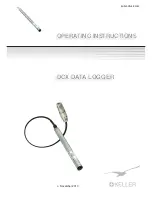
4
1-4. Features
o
Wide-band, high-resolution, multichannel recording
of 16 channels at 16-bit or 8 channels at 24-bit with
frequency bandwidths up to DC 40 kHz
o
Wide dynamic range realized using 24-bit analog to
digital conversion
o
SDHC/SDXC cards, which are easy to obtain, used for
recording media
o
Recording up to 64 channels is possible by com-
bining one LX-1000 with three AU-LX1000EPIO
expansion units
o
Recording up to 256 channels is possible by synchro-
nizing four units
o
High-speed data transmission with computers is pos-
sible using Gigabit Ethernet
o
LXK Navi software for settings and waveform display
included
o
TAFFmat data format used
o
Voice memo recording and playback
o
Stopping and starting recording and playback is pos-
sible using external contact inputs
o
Files are saved regularly, preventing data loss due to
unexpected power interruptions
o
DC input and IEPE sensor input can be used for ana-
log input
o
Signal line interruption detection for each channel
when using IEPE sensors
o
Reads IEPE sensor TEDS information
o
Analog monitoring output is possible during record-
ing and playback
o
Detection of analog filter input saturation due to
excessive input
o
Fanless operation enables clear sound and vibration
measurement (in systems with up to 32 channels)
A cooling fan is necessary if even one AR-LXST1000 is
installed.
1. Introduction
1-5. System configurations
This system is comprised of a main unit (LX-1000) and
one or more expansion units (AU-LX1000EPIO).
Main unit (LX-1000)
Expansion unit (AU-LX1000EPIO)
By adding more AU-LX1000EPIO expansion units, you
can increase the number of input and output channels.
We offer products with 1, 2 and 3 AU-LX1000EPIO expan-
sion units.
32-channel model
48-channel model
64-channel model
o
When multiple AU-LX1000EPIO expansion units are
connected, channel numbering starts with channel 1
at the top left and ends with the last channel (32, 48 or
64) at the bottom right.



































